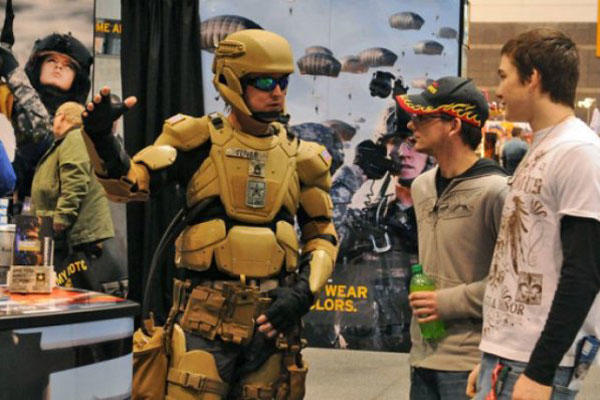U.S. Special Forces leaders have lined up to say America's next generation special operators need a suit with some of the same capabilities as the one Iron Man has worn in movies and comic books.
However, Sen. Tom Coburn, R-Oklahoma, included the high-tech combat fighting suit in his 2014 edition of "Wastebook," an annual compendium of programs he considers a waste of tax payers' money.
"Only someone with too much of someone else's money and not enough accountability for how it was being spent could come up some of these projects," Coburn said in the introduction of the Wastebook.
In all, Coburn says the federal government wasted $25 billion in 2014 - with civilian departments such as the National Science Foundation putting $171,000 into teaching monkeys how to play video games and gamble and a $10,000 Interior Department program that paid people "to watch grass grow."
Coburn said the Pentagon estimates the Iron Man suit - officially the Tactical Assault Light Operator Suit, or TALOS - will cost $80 million to produce, but says an industry source predicts the price tag will eventually climb to $1 billion.
"But the real shock and awe may have been the $1 billion price tag the Pentagon paid to destroy $16 billion worth of ammunition, enough to pay a full years' salary for over 54,000 Army privates," Coburn said.
The latest Wastebook, which lists 100 programs, is the fifth Coburn has compiled.
Along with the Iron Man suit and the ammo destruction, Coburn also hit other military spending, including:
- $1 billion toward a ballistic missile defense system that would stop only three out of 10 incoming missiles. The eventual price tag is $41 billion, Coburn says.
- $9 million in excess payments for helicopter parts, purchased under a sole-source noncompetitve contract with Bell Helcopter that resulted in the Pentagon paying 16 times the going price for parts. Coburn sites a number of examples from a Bloomberg News report, including the Pentagon paying $2,356 for a part that actually cost $297.
- $468 millioni for 20 planes intended to be "the backbone" of the Afghan air force, but then sold for scrap for $32,000.
- $72,000 to mail out 9,500 copies of the Navy's Currents magazine, including issues touting the Navy's drive toward using "green" technologies.
- $639,000 so the Air Force can send anthracite coal mined in Pennsylvania to Germany for the heating of U.S. bases there. Coburn notes this is not a DoD or Air Force initiative, but an earmark inserted into the budget in the 1960s by one of Pennsylvania's senators to keep the industry going.
- $414,000 for "America's Army," a "first-person" shooter game available online as a recruiting tool, but which U.S. intelligence officials say can easily double as a terrorist training tool.
- $21 million to construct buildings in Afghanistan that were not built to international standards and code and often caught fire and burned to the ground.
- $1.2 billion in Department of Veterans Affairs disability compensation for sleep anpea. More than 149,000 veterans now draw a 50 percent rating for the condition, he said, a major change since 2000, when only 1,000 veterans carried a disability for the condition.
Curburn also included the VA as part of an overall government waste of $19 billion related to employees behaving badly. Much of the money went for paid administrative leave while an employee was under investigation for an alleged violation.
"Much like Congress, thousands of federal employees who weren't doing their jobs properly have been sent home and paid to do nothing - many for years," Coburn said. "Some committed crimes. Others engaged in misconduct."
In the case of the VA, Coburn cited the ongoing patient wait-times scandal. Not only have patient deaths been linked to manipulated appointment dates, but some exectuives pulled down thousands of dollars in bonuses based, in part, on the efficiency of the apointment scheduling system.
-- Bryant Jordan can be reached at bryant.jordan@military.com


























